
New technologies are changing the relationship between people and their cities. Sophisticated smart systems operating within the 5G network will allow automation of agglomeration management and enable better adjustment of urban tissue to individual needs of the dwellers. Widespread use of IoT solutions will allow mass implementation of smart transportation and lighting systems or even automated trash pickup schedules in cities.
“City dwellers are an interface of the urban space in terms of needs the residents formulate. They are an interface, the essence and the consumers of the city. It is important what their needs are, what their lives will look like today, soon and over the forthcoming years. How will urban space digitalization affect their lives? This triggers social and economic trends, meaning how people will react, work, rest, fulfil their basic needs, commute or move around the city. In this context the residents are mainly the generators of knowledge on how the city should be constructed,” Remigiusz Wiśniewski, a member of the Internet-of-Things Taskforce in the Ministry of Digital Affairs, told Newseria Innowacje agency.
In Poland, IoT autonomous systems are only in their early stage of development. Smart technologies are most often implemented as pilot projects or on a small scale. To popularise such solutions, the Ministry of Digital Affairs set up the Internet-of-Things Taskforce, which will be monitoring and controlling the development of this field of industry, which poses attractive prospects. First, the ministry’s experts prepared an extensive report called “IoT in the Polish Economy”, where they described the legal context for implementing IoT solutions and listed industries which will benefit from them the most.
“Our population is changing over time. By 2050 there will be no more than 35 million Poles or even less, as more pessimistic forecasts indicate. On one hand, we must consider how to fill in this population gap, and on the other, how to convince people to stay in our country, in our cities. Preparing us to create a better place to live, ensuring better communication, enhancing transportation or better resource management – these are genuinely important challenges from the perspective of urban space shaping,” the expert says.
The report concludes that the development of IoT solutions will provide benefits to both manufacturers of simple internet-controlled devices and creators of sophisticated, autonomous solutions intended for autonomous transportation or industrial robots, for instance, as well as designers of digital business platforms for energy consumption optimisation or smart control of public transport systems.
“Examples are already here, though these are rather silo solutions. They include smart lighting, ITS, smart garbage bins and parking lots are popping up here and there, but this is still an early, development stage, if we compare other European cities,” says Remigiusz Wiśniewski.
The first Polish cities are already experimenting with smart city technologies. The Smart Cities Accelerator has been established – it is to facilitate implementation of such solutions. One of the cities that has reached out to gain the Accelerator’s support was the municipality of Katowice, which organised a competition for a system of communication between city officials and residents. Authorities of the town of Mysłowice proved that smart systems may successfully be implemented even in garbage bins. City bins will be connected to the Internet and their fill-levels will be remotely controlled by an application.
One of the major technologies allowing development of IoT platforms will be 5G communication systems, which will enable us to transfer data faster and better using today’s communication infrastructure. Ericsson analysts have talked about the role of expansion of smart systems. According to this corporation’s estimates, only by 2021 will there be nearly 28 billion devices operating within the Internet of Things standard, and a significant portion of them will be used in smart city systems. According to Ericsson, only after 5G technology is widespread, will the full potential of IoT solutions be unleashed.
“Internet of Things” will change each and every field of our life. This is already happening. You might not see it that clearly, but within the forthcoming decades one could expect our lives to look differently. Urbanization will bring about transportation problems and challenges still unknown today will force us to apply solutions which will simply change the faces of our cities. We can already see such small projects like electric scooters for rent or car sharing, because these services also belong to the smart city dimension,” concludes Remigiusz Wiśniewski.
According to MarketsandMarkets analysts, the global market of smart city technologies in 2018 totalled 308 billion dollars. By 2023 this value is to reach 717.2bn dollars given an average growth rate of 18.4 per cent.
Source: Newseria https://innowacje.newseria.pl/news/polskie-miasta,p998799265




